13. Enter the Narrow Gate (Matthew 7:13-29)
by Dr. Ralph F. WilsonAudio (33:55)
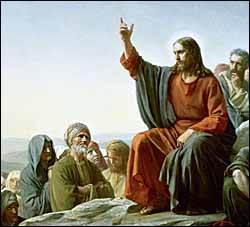 Carl Heinrich Bloch (Danish painter, 1834-1890), detail from "Sermon on the Mount," Full image. |
13 "'Enter through the narrow gate. For wide is the gate and broad is the road that leads to destruction, and many enter through it. 14 'But small is the gate and narrow the road that leads to life, and only a few find it.
15 "Watch out for false prophets. They come to you in sheep's clothing, but inwardly they are ferocious wolves. 16 By their fruit you will recognize them. Do people pick grapes from thornbushes, or figs from thistles? 17 Likewise every good tree bears good fruit, but a bad tree bears bad fruit. 18 A good tree cannot bear bad fruit, and a bad tree cannot bear good fruit. 19 Every tree that does not bear good fruit is cut down and thrown into the fire. 20 Thus, by their fruit you will recognize them.
21 'Not everyone who says to me, "Lord, Lord," will enter the kingdom of heaven, but only he who does the will of my Father who is in heaven. 22 Many will say to me on that day, "Lord, Lord, did we not prophesy in your name, and in your name drive out demons and perform many miracles?" 23 Then I will tell them plainly, "I never knew you. Away from me, you evildoers!"
24 'Therefore everyone who hears these words of mine and puts them into practice is like a wise man who built his house on the rock. 25 The rain came down, the streams rose, and the winds blew and beat against that house; yet it did not fall, because it had its foundation on the rock. 26 But everyone who hears these words of mine and does not put them into practice is like a foolish man who built his house on sand. 27 The rain came down, the streams rose, and the winds blew and beat against that house, and it fell with a great crash.'
28 When Jesus had finished saying these things, the crowds were amazed at his teaching, 29 because he taught as one who had authority, and not as their teachers of the law." (7:13-29)
Too often we Christians live in the land of gray, a land devoid of moral absolutes, a land that has so dulled the cutting edge of our faith that we have accepted lethargy and disobedience as our daily fare, and almost believe our own rationalizations. At the conclusion of Jesus' Sermon on the Mount, the Jesus Manifesto, we find a wake-up call, a call to listen and obey, a call to follow.
Jesus, the consummate teacher, conveys the urgency of his call in a series of word pairs that draw the issues sharply:
| Narrow gate | Wide gate (13) |
| Narrow path | Broad way (14) |
| Life | Destruction (13-14) |
| Few | Many (13-14) |
| Sheep | Wolves (15) |
| (True prophets) | False prophets (15) |
| Good fruit | Bad fruit (16-20) |
| Good tree | Bad tree (16-20) |
| Grapes | Thornbushes (16) |
| Figs | Thistles (16) |
| Doers of his will | Mere professors (21-23) |
| Wise man | Foolish man (24-27) |
| Rock | Sand (24-27) |
| Did not fall | Fell with a great crash (24-27) |
This passage examines deceit and discernment, first at the level of the masses ("broad is the way"), then at the level of the congregation ("false prophets" who are "wolves in sheep's clothing"), and finally at the personal level where we can deceive ourselves into thinking that we can hear without obeying.
The Small Gate and the Narrow Way (7:13-14)
13 "'Enter through the narrow gate. For wide is the gate and broad is the road that leads to destruction, and many enter through it. 14 'But small is the gate and narrow the road that leads to life, and only a few find it." (7:13-14)
Sometimes Christian salvation is portrayed in such generous terms that all people will be saved -- even the devil. This kind of teaching is called universalism. In the New Age Movement and some of its Eastern Religion roots we hear the view that there are many roads to God, and that the World's Great Teachers -- Buddha, Moses, Jesus, Mohammed -- all brought great truths, many of which are similar. There are many roads that lead to God, this teaching suggests. And eventually everyone finds God. Except, perhaps, for the evil few such as Hitler and the like.
But what Jesus teaches is much different -- radically different. In verses 13-14 we see:
- A Command: Enter through the narrow gate.
- An Explanation:
(a) For the gate is wide and the way broad that leads to destruction
(b) And many enter through it.
(c) But the gate is small and the path narrow that leads to life
(d) And only a few find it.
The last sentence has two key phrases:
"Only a few..." We are impressed with numbers. Largest, greatest, most. Jesus isn't. We feel that majority opinion rules. Jesus walked his own lonely path. He called Twelve and named them apostles, and from those Twelve the Christian movement was born. At times in history the Christian movement has appeared to hang by a thread. One person, one small band of people. St. Patrick in Ireland or Adoniram Judson in Burma. If we are to learn to follow Jesus, we must be committed to following him where others will not go. Where we are scorned, alone, solitary.
"... find it." The second phrase is "find it." Finding something presupposes searching earnestly for it. Jesus has just taught, "Seek and you shall find." The way is clear only to those who search for it, for at times it doesn't not seem well-trodden, though many saints have walked that way.
Leads to Destruction (7:13)
The destination also is startling. One path leads to destruction, the other to life. What does "destruction" mean? The Greek word is apōleia denotes "the 'destruction' that one experiences, 'annihilation' both complete and in process, 'ruin.'"1 Whenever we see the word in the New Testament it seems to promise a terrible end:
"May your money perish with you..." (Acts 8:20)
"... Objects of his wrath, prepared for destruction." (Romans 9:22)
"This is a sign to them that they will be destroyed, but that you will be saved." (Philippians 1:28)
"Their destiny is destruction...." (Philippians 3:19)
"... The man of lawlessness is revealed, the man doomed to destruction." (2 Thessalonians 2:3)
"... Many foolish and harmful desires that plunge men into ruin and destruction." (1 Timothy 6:9)
"... Bringing swift destruction on themselves." (2 Peter 2:1)
"By the same word the present heavens and earth are reserved for fire, being kept for the day of judgment and destruction of ungodly men." (2 Peter 3:7)
"... Which ignorant and unstable people distort, as they do the other Scriptures, to their own destruction." (2 Peter 3:16)
"The beast, which you saw, once was, now is not, and will come up out of the Abyss and go to his destruction." (Revelation 17:8, also 11)
We know from Revelation 20:10 that the destruction facing the "beast" is called "the lake of burning sulfur" where "they will be tormented day and night for ever and ever." This "lake of fire," also called "the second death," is the destination for all those whose names are not found in the Lamb's Book of Life (Revelation 20:14-15). The destruction Jesus speaks of is a terrible prospect, a terrible reality.
We are commanded to enter the narrow gate or face destruction. What about our friends? Our relatives? Our associates at work or school? What is their end without Christ? Part of the essential message of Jesus is a clear view to our responsibility to:
"Go into all the world and preach the good news to all creation. Whoever believes and is baptized will be saved, but whoever does not believe will be condemned." (Mark 16:15-16; see also Matthew 28:19 and Acts 1:8)
This is a hard message, isn't it? Not too popular in our pluralistic culture. But it is Jesus' message.
| Q1. (Matthew 7:13-14) If Jesus' teaching about the narrow gate and the narrow road to life is to be believed, what change would this make in how you conduct your life? What difference would it make to how you witness to your neighbors? How might it affect your acceptance of Universalism? https://www.joyfulheart.com/forums/index.php?showtopic=787
|
Watch out for false prophets (7:15-20)
15 "Watch out for false prophets. They come to you in sheep's clothing, but inwardly they are ferocious wolves. 16 By their fruit you will recognize them. Do people pick grapes from thornbushes, or figs from thistles? 17 Likewise every good tree bears good fruit, but a bad tree bears bad fruit. 18 A good tree cannot bear bad fruit, and a bad tree cannot bear good fruit. 19 Every tree that does not bear good fruit is cut down and thrown into the fire. 20 Thus, by their fruit you will recognize them." (7:15-20)
The second command in this passage is to "watch out for" false prophets. The Greek word is prosechō, "be in a state of alert, be concerned about, care for, take care," here "beware of" something.2
What do they look like? How can you tell if someone is a false prophet? First, Jesus says that they look like everyone else. They come in "sheep's clothing," that is, they look like other members of the flock. But they're also "prophets," that is, they're active in the church, they're opinion leaders, and vocal. I've met a few of these false prophets in my day. To outward appearances they aren't particularly bad people. But Jesus says that their inward character is as ravenous wolves. They destroy the unity of the flock and pull away the sheep who are at the edges to fulfill their own personal agendas.
So how do you tell them from the other sheep? By their fruit, that is, by their words and deeds. There is no one formula for false prophets, but you'll find bad fruit if you look for it.
Bad fruit
Now Jesus shifts analogies from sheep/wolf to good tree/bad tree, good fruit/bad fruit. It is impossible, he says, for a bad tree to bear good fruit.
What is a bad tree? It is one whose fruit isn't good for eating. If you have many native fruit trees -- not the cultured ones you buy at the nursery -- you find that some bear excellent fruit. Delicious, succulent, well-shaped. Others bear fruit that is isn't fit for eating in some way or another. It may be too sour or with flesh that is too dry. Or it may be shriveled or deformed in shape. It is in the character of the tree itself, Jesus says: A good tree can be counted on to bear good fruit. Period. A bad tree, no matter how hard it tries to work itself up to good fruit, will still bear fruit after its own character. It may be a beautifully formed tree with wonderful branches and cool shade. But when fruit-tasting time comes, its true nature is revealed. "By their fruit you shall know them," Jesus says.
The Apostle Paul warned the elders of the Church at Ephesus:
"I know that after I leave, savage wolves will come in among you and will not spare the flock. Even from your own number men will arise and distort the truth in order to draw away disciples after them. So be on your guard! Remember that for three years I never stopped warning each of you night and day with tears." (Acts 20:29-31)
Inedible Fruit
What kind of fruit do you look for? We're not talking about perfection in our leaders. None of us is perfect. We must be gracious towards one another, and bear with each others' weaknesses. But by bad fruit, Jesus is suggesting:
- Strange or somewhat perverted teachings.
- Dominant character flaws.
- Actions and attitudes that don't conform to what you expect of a Christian leader.
False prophets ravage the flock and destroy sheep. Sometimes those false sheep are the pastors themselves. They teach one thing and then live another way. But when their lifestyle is exposed, it devastates the congregation who had been taken in by their hypocrisy. I've seen treasurers with the sin of greed who can control and turn a congregation away from God's will. I've seen power-hungry trustees take godly pastors, chew them up and spit them out, because the godly pastors tried to actually lead the congregation in God's ways and past the point where the controlling church trustees could take them.
You probably have your own horror stories. I can remember a man whom I'll refer to as Billy. Billy and his wife were dear people who attracted hurting people and helped them. Billy saw himself as a teacher, though he didn't have a teaching gift. But more and more Billy set himself up as someone spiritual in order to draw people to himself. One day he got arrested for being drunk and disorderly and blamed everyone else but himself. I should have seen it then, but I was so intent upon redeeming Billy and overlooking his flaws, that I couldn't see how dangerous he was. Finally, Billy began actively and maliciously undermining my leadership and trying to usurp my authority, endeavoring to set up himself and a couple of other immature leaders as elders in the body. Billy and his wife finally left, but they left behind a wounded and ravaged flock that was never the same again.
I've tried very hard to learn from this experience and not be bitter. There are some wrong lessons, such as: Never trust people again. Or: Hold all the power yourself. But the better lessons are those Jesus wants us to learn, which are: Watch out for false prophets and observe their fruits. I think that means to be aware that there will be false prophets, that our congregations will not be immune from them. And it means to hold people responsible for their actions.
Accountability
Congregations can be extremely picky; instead we need to be gracious and loving and forgiving. But we must hold to a higher standard those who aspire to leadership and influence (1 Timothy 3:1ff). Leaders who bear bad fruit, who sin, who fail, must be disciplined. Paul wrote:
"Do not entertain an accusation against an elder unless it is brought by two or three witnesses. Those who sin are to be rebuked publicly, so that the others may take warning. I charge you, in the sight of God and Christ Jesus and the elect angels, to keep these instructions without partiality, and to do nothing out of favoritism." (1 Timothy 5:19-21)
Exercising church discipline when it is needed is one of the most important checks and balances we can have to prevent wolves from gaining ascendancy. Laxity about church discipline creates a breeding ground for false prophets.
Another lesson I have learned is that a person who at one point in time may be of strong character, can at a later time become compromised by sin. Yes, Christians, even strong Christians, can be deceived and seduced by the evil one. The writer of Hebrews warns us,
"See to it that no one misses the grace of God and that no bitter root grows up to cause trouble and defile many." (Hebrews 12:15).
We are also to take heed to ourselves (Galatians 6:1; Luke 21:34). Many church splits and heresies are caused by people who initially had a close and true walk with the Lord, but later allowed the tempter to turn them aside from the narrow way.
If you were to look for false prophets in the context of Jesus' ministry, who would they be? The Pharisees, no doubt, who forcefully and publicly led their followers astray (see, for example, Matthew 23). Were the Pharisees entirely wrong? No. The truth was mixed with error. One time Jesus said,
"So you must obey them and do everything they tell you. But do not do what they do, for they do not practice what they preach" (Matthew 23:3).
In other words, their doctrine wasn't nearly as bad as their practice of it.
Learning to "watch out for false prophets" has been one of the hardest lessons I've had to learn in my life and ministry. But I'm learning. I hope you are, too.
| Q2. (Matthew 7:15-20) Jesus says that one's inner self will eventually become apparent (Matthew 12:34). What kinds of "fruit" might be clues to a false prophet? https://www.joyfulheart.com/forums/index.php?showtopic=788
|
Obedient followers versus mere professors (7:21-23)
Here's another hard saying:
"Not everyone who says to me, 'Lord, Lord,' will enter the kingdom of heaven, but only he who does the will of my Father who is in heaven. Many will say to me on that day, 'Lord, Lord, did we not prophesy in your name, and in your name drive out demons and perform many miracles?' Then I will tell them plainly, 'I never knew you. Away from me, you evildoers!' " (7:21-23)
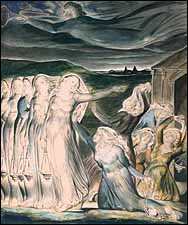 William Blake, "Parable of the Wise and Foolish Virgins" (1822), watercolor, Tate Collections. Larger image. |
Why is it so hard? To have the Lord say to someone, "I never knew you," seems overly harsh. How could he not know someone? We see a similar phrase in Jesus' Parable of the Ten Virgins:
"But while they were on their way to buy the oil, the bridegroom arrived. The virgins who were ready went in with him to the wedding banquet. And the door was shut.
"Later the others also came. 'Sir! Sir!' they said. 'Open the door for us!'
"But he replied, 'I tell you the truth, I don't know you.'"(Matthew 25:10-12)
The Greek word for "know," ginōskō, has a number of nuances of meaning. It can mean "to know" at a basic level. It can also mean, "to understand, comprehend," and even be a euphemism for sexual relations. A rarer but important meaning is "to indicate that one does know, 'acknowledge, recognize' as that which one is or claims to be."3 Thus in our passage it can mean, "I never recognized you (as being my disciple)." See similar uses in John 1:10; 1 Corinthians 8:3; and Galatians 4:9.
Self-Deception
In both our passage and the Parable of the Ten Virgins, there were people who considered themselves as part of the in-crowd. They used God's name ("Lord, Lord"), they had gotten a supply of oil so they could be in the wedding procession, they had done miracles by God's power, they had driven out demons. But the final answer was, "I never knew you."
In both cases you see those who are self-deceived. They perceive themselves as true followers, but they are not really. James gave a similar parable of self-deception:
"Do not merely listen to the word, and so deceive yourselves. Do what it says. Anyone who listens to the word but does not do what it says is like a man who looks at his face in a mirror and, after looking at himself, goes away and immediately forgets what he looks like. But the man who looks intently into the perfect law that gives freedom, and continues to do this, not forgetting what he has heard, but doing it -- he will be blessed in what he does." (James 1:22-25)
This is a chief danger for those, like myself, who have grown up in the church. I've heard (and delivered) thousands of sermons. I have seen and been involved in miracles and exorcisms. Judas had, too. I've even prophesied in Jesus' name. I've read the Bible through dozens of times. I am extremely familiar with the Word. But do it practice it? Do I do what it says? That is the chief question.
Being around spiritual things can be deceptive. We can feel that we are spiritual because we are around the spiritual. We can feel like we are being obedient because we know what is the right thing to do.
In the Sermon on the Mount, it wasn't a question of confessing Christ as Lord or of doing good works. The question was one of obedience.
"Not everyone who says to me, 'Lord, Lord,' will enter the kingdom of heaven, but only he who does the will of my Father who is in heaven." (7:21)
Do I do what Christ shows me to do, or do I just think about it?
Faith and works
All this emphasis on doing and action can confuse Christians who were raised on Martin Luther's sola fide, "only faith" teaching. This "doing" smacks of "works righteousness," or "salvation by works."
I don't think Jesus' teaching is "works righteousness" at all. Remember his teaching about the tree and its fruit? He is saying that the fruit is the natural expression of the inner character. In the same way our obedience to Jesus is the natural result of an inner trust in him and faith in him -- just as rebelliousnessis the result of an inner distrust of Jesus and inherent trust in our own direction-finding techniques.
When James says, "Faith by itself, if it is not accompanied by action, is dead" (James 2:17), he isn't contradicting Paul's emphasis on salvation as a gift through faith. He is agreeing with it. He is affirming that faith, if it is truly present, will bear fruit in actions. That's the same thing Jesus is saying, "By their fruits you shall know them."
False assurance
This is the point when some try to give us a false assurance: "If you've prayed the sinner's prayer and invited Jesus into your heart," they say, "you're okay." On the contrary, this is a case where,
"They dress the wound of my people as though it were not serious. 'Peace, peace,' they say, when there is no peace." (Jeremiah 6:14)
This passage is not about offering assurance -- he does that elsewhere -- but about piercing our own self-deception. And we can only do that by looking squarely at ourselves with the help of the gracious Holy Spirit.
I know from personal experience that it is possible to have a Sunday-Go-to-Meeting acquaintance with God. It is possible to have a professional clergy relationship with God. But none of these is adequate. The question is not what church work we do. The question is whether we are personally obedient to Christ himself. Do we follow our faith, our church, our religion? Or do we follow Christ himself?
Christian leader David DuPlessis once wrote a pamphlet entitled, "God Has No Grandsons." We cannot rely on our parent's faith, or someone else's experience or faith. We must come to Jesus and humble ourselves before him as his personal disciples, his personal followers. Our heart must be his, and his alone.
My dear friends! It is so very easy to deceive ourselves. The question is not whether you do Christian things and say Christian words. It is not whether you have had some Christian "experience," as wonderful as that is. It is whether we will do the will of Jesus' Father who is in heaven. It is whether we will be his disciples or our own headstrong, self-willed controllers of our own destiny. Must we do it our way? Or are we willing to do it his way, even if we don't understand all the dimensions of that?
In the last analysis, Jesus will say to those who do not follow him and him only,
"I never knew you. Away from me, you evil-doers." (7:23)
| Q3. (Matthew 7:21-23) How is it possible to deceive yourself, so that you presume that you are "doing" when you are only "hearing"? (see James 1:22-25). How might it be possible to prophesy, drive out demons, and perform miracles in Jesus' name and not enter the Kingdom of heaven? https://www.joyfulheart.com/forums/index.php?showtopic=789
|
The Parable of the Wise and Foolish Builders (7:24-27)
24 "Therefore everyone who hears these words of mine and puts them into practice is like a wise man who built his house on the rock. 25 The rain came down, the streams rose, and the winds blew and beat against that house; yet it did not fall, because it had its foundation on the rock. 26 But everyone who hears these words of mine and does not put them into practice is like a foolish man who built his house on sand. 27 The rain came down, the streams rose, and the winds blew and beat against that house, and it fell with a great crash." (7:24-27)
The Sermon on the Mount concludes with the Parable of the Wise and Foolish Builders. It doesn't stand by itself, but is an illustration of Jesus' hard saying about self-deception. The point of the parable is that the wise person not only hears Jesus' words, but also puts them into practice.
In Jesus' day, most buildings were built of stones or mud bricks. In his day and ours, contractors can be sloppy and try to take shortcuts. It's much faster to slap up a house than to build it the right way. But only the right way lasts through the storms.
In the parable, the wise man built his house upon the rock, while the foolish man built his house upon the sand. "The rain came down," Jesus, said, "the streams rose, and the winds blew, and beat against that house...." The well-founded house stood, while the house without foundations fell with a great crash.
I'm sure that Jesus' hearers wondered in their hearts: Which kind of house am I building? Do I have an adequate foundation? And I ask you: Which kind of house are you building? Have you sunk your foundations into Jesus, the true Rock? Are you both hearing his words and putting them into practice in your life? If so, when the storms of life come -- and they will -- you will continue to stand. If not, you'll fall apart.
| Q4. (Matthew 7:24-27) Does Jesus requireobedience of his disciples? (John 15:14). Is there a kind of true Christian who believes, but does not obey? How do you justify Jesus' requirement of obedience with Paul's teaching that salvation is a gift, not because of works, lest anyone should boast (Ephesians 2:8-10)? https://www.joyfulheart.com/forums/index.php?showtopic=790
|
As one who had authority (7:28-29)
28 "When Jesus had finished saying these things, the crowds were amazed at his teaching, 29 because he taught as one who had authority, and not as their teachers of the law." (7:28-29)
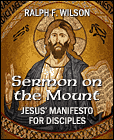 Sermon on the Mount: The Jesus Manifestois available in paperback and ebook formats |
And so Jesus finished his teaching. The crowds were amazed. They had heard various teachers quoting other great men to bolster their cases. But Jesus spoke with authority, his own authority and that of his Father. And they were amazed.
Many followed Jesus as a result of hearing his awesome teaching. Others just thought about it and agreed with it inwardly and were satisfied with that.
As for me, I want to follow. Will you join me in this journey?
Prayer
Friends, would you pray with me:
Dear Jesus. When all is stripped away, it's just you and me. How much distance is there between us? Am I following you closely or tagging along behind? Please forgive me for my waywardness. Forgive me for thinking I knew better. Forgive me for ignoring your gentle voice. Forgive me for not trusting you.
Jesus, you died for my sins. You gave yourself on the cross to forgive me. You rose from the dead to assure me of your strong life and presence forever.
Lord, this day I declare my trust in you afresh. Today I'm running to catch up, to take ahold of you, to kneel at your feet. And from this day, Lord, help me to stay close so I can hear your quiet words and encouragements and directions. Help me not to lag behind ever again. Help me to be your true follower, your true disciple. Now and forever. Amen
Jesus told His disciples that there was a "narrow gate" to enter through to be saved when His disciples questioned Him:
And He went through the cities and villages, teaching, and journeying toward Jerusalem. Then one said to Him, “Lord, are there few who are saved?” And He said to them, “Strive to enter through the narrow gate, for many, I say to you, will seek to enter and will not be able (Luke 13:22-24 NKJV).
Contrary to the gate that is narrow that leads to salvation, Jesus also said there is a wide gate that leads to hell:
Enter by the narrow gate; for wide is the gate and broad is the way that leads to destruction, and there are many who go in by it. Because narrow is the gate and difficult is the way which leads to life, and there are few who find it (Matthew 7:13-14 NKJV).
What is the Narrow Gate?
Luke describes the events of the risen Christ's days before He ascended to Heaven:
Until the day in which he was taken up, after that he through the Holy Ghost had given commandments unto the apostles whom he had chosen: To whom also he shewed himself alive after his passion by many infallible proofs, being seen of them forty days, and speaking of the things pertaining to the kingdom of God: And, being assembled together with them, commanded them that they should not depart from Jerusalem, but wait for the promise of the Father, which, saith he, ye have heard of me. For John truly baptized with water; but ye shall be baptized with the Holy Ghost not many days hence (Acts 1:2-5).
So what did Jesus teach the disciples during the forty days that He was with them prior to the Ascension? Did He teach them the narrow gate leading to heaven or the wide gate leading to hell? Yes, silly question, but having said that there are millions upon millions that are not using the narrow gate to salvation that Jesus taught His disciples. Really, the best way to answer that question is to examine the disciples "actions" i.e.” the Acts of the Apostles”, in the first century AD.
The Narrow Gate to Salvation
There are ten examples, in the Acts of the Apostles, where lost souls entered through the "narrow gate" to salvation. These are:
- Upper Room on the Day of Pentecost (Acts 2:1-4)
- First sermon of the New Covenant (Acts 2:14-41)
- Samaria (Acts 8:5-25)
- Eunuch of Ethiopia (Acts 8:26-39)
- Apostle Paul (Acts 9:1-18)
- Cornelius and household (Acts 10:1-48)
- Lydia and household (Acts 16:12-15)
- Philippian jailer and family (Acts 16:24-34)
- Crispus, his house and other Corinthians (Acts 18:8)
- John the Baptist's disciples (Acts 19:1-7)
The Upper Room on the Day of Pentecost
In the upper room (Acts 1:13), about one hundred and twenty lost souls (Acts 1:15), including the disciples and Mary , the mother of Jesus (Acts 1:14), gathered and waited for the baptism of the Holy Ghost as Jesus had commanded,
And, behold, I send the promise of my Father upon you: but tarry ye in the city of Jerusalem, until ye be endued with power from on high (Luke 24:49).
and
But ye shall receive power, after that the Holy Ghost is come upon you: and ye shall be witnesses unto me both in Jerusalem, and in all Judaea, and in Samaria, and unto the uttermost part of the earth (Acts 1:8).
Let’s read about this supernatural event:
And when the day of Pentecost was fully come, they were all with one accord in one place. And suddenly there came a sound from heaven as of a rushing mighty wind, and it filled all the house where they were sitting. And there appeared unto them cloven tongues like as of fire, and it sat upon each of them. And they were all filled with the Holy Ghost, and began to speak with other tongues, as the Spirit gave them utterance (Acts 2:1-4).
Why would anybody think that the narrow gate to heaven does not include exactly what happened in the Upper Room? Why, because the wide gate is convenient, it allows people to say:
- "I received the Holy Ghost when I was baptized as a baby."
- "I received the Holy Ghost when I accepted Jesus as my savior."
- "It automatically happens when a person is baptized."
- "That's more than grace plus nothing"
When, you ask them to show you where what they have said happened in the Bible, they can't, which makes sense because there are no examples. These untruths have been fabricated over the centuries as part of the wide gate to, supposedly heaven, but unfortunately, as Jesus said, to hell. Some who have actually read the Bible, might say something like this:
- "It is not necessary to speak in tongues, just look at Lydia, she received the Holy Ghost and never spoke in tongues.
It is true that the Bible is silent on whether Lydia spoke in tongues or not. The same is true for the Phillipian jailer and for Crispus. We will examine this response in more detail when we get to Lydia and her household.
First Sermon of the New Covenant
After God poured out His Spirit on humanity in the Upper room, the Apostle Peter preached the first sermon (Acts 2:14-41). Near the end of the sermon, the crowd was convicted:
Now when they heard this, they were pricked in their heart, and said unto Peter and to the rest of the apostles, Men and brethren, what shall we do (Acts 2:37)?
To which Peter responded:
Repent, and be baptized every one of you in the name of Jesus Christ for the remission of sins, and ye shall receive the gift of the Holy Ghost (Acts 2:38).
The narrow gate to salvation must include:
- Repentance
- Baptism for everyone in the name of Jesus Christ for the remission of sins, and
- Receiving the gift of the Holy Ghost
What happened after Peter preached this message?
Then they that gladly received his word were baptized: and the same day there were added unto them about three thousand souls (Acts 2:41).
This account specifically says that the "about three thousand souls" were baptized and "added unto them". The account is silent on the infilling of the Holy Ghost but since they were "added unto them", one can only conclude that they had repented and received the Holy Ghost, in the exact manner (speaking in tongues as the Spirit gave them utterance) as the first one hundred and twenty lost souls had experienced earlier in the day.
Samaria
Within two years of the day of Pentecost, the evangelist Philip was preaching in Samaria:
And the people with one accord gave heed unto those things which Philip spake, hearing and seeing the miracles which he did. For unclean spirits, crying with loud voice, came out of many that were possessed with them: and many taken with palsies, and that were lame, were healed. And there was great joy in that city (Acts 8:6-8).
Even though the Samaritans loved the miracles and were filled with joy, Phillip kept on preaching the narrow gate to salvation and believers were baptized:
But when they believed Philip preaching the things concerning the kingdom of God, and the name of Jesus Christ, they were baptized, both men and women (Acts 8:12).
The church leaders in Jerusalem sent the Apostles Peter and John to join him:
Now when the apostles which were at Jerusalem heard that Samaria had received the word of God, they sent unto them Peter and John: Who, when they were come down, prayed for them, that they might receive the Holy Ghost: (For as yet he was fallen upon none of them: only they were baptized in the name of the Lord Jesus.) Then laid they their hands on them, and they received the Holy Ghost (Acts 8:14-16).
Watching and listening to all of these events was Simon, the sorcerer. This is significant to understand the importance of speaking in tongues when we receive the gift of the Holy Ghost, as part of the narrow gate to salvation, because,
And when Simon saw that through laying on of the apostles' hands the Holy Ghost was given, he offered them money, Saying, Give me also this power, that on whomsoever I lay hands, he may receive the Holy Ghost (Acts 8:18-19).
The obvious question is: “what did Simon see and hear that would cause him to try and buy what only God can do?” It had to be something! It's intuitively obvious - Simon saw and heard them speak in tongues as the Spirit gave utterance. What else could it possibly have been that caused Simon to react in this manner immediately after the Holy Ghost was poured out in Samaria?
Another significant fact disclosed by this account of salvation is that Peter told Simon that the Holy Ghost was a gift from God and that he needed to repent first before Jesus would give him this gift:
But Peter said unto him, Thy money perish with thee, because thou hast thought that the gift of God may be purchased with money. Thou hast neither part nor lot in this matter: for thy heart is not right in the sight of God. Repent therefore of this thy wickedness, and pray God, if perhaps the thought of thine heart may be forgiven thee. For I perceive that thou art in the gall of bitterness, and in the bond of iniquity (Acts 8:20-23).
This incident was written to make an emphatic statement - without true repentance, God will never give the precious gift of the Holy Ghost.
Obeying Acts 2:38 is absolutely necessary to enter the narrow gate to heaven.
Eunuch of Ethiopia
When Philip left Samaria, God gave him specific directions to return to Jerusalem (Acts 8:26). On his way he encountered a eunuch who worked for Queen Candace of Ethiopia (Acts 8:27). The eunuch was returning to Ethiopia from Jerusalem where he had been worshiping. Philip heard the eunuch reading the Bible and asked him,
... Understandest thou what thou readest (Acts 8:30)?
and the eunuch responded,
... How can I, except some man should guide me? And he desired Philip that he would come up and sit with him (Acts 8:31).
The eunuch had been reading Isaiah 53:7, one of Isaiah's many prophecies about Christ's crucifixion:
... He was led as a sheep to the slaughter; and like a lamb dumb before his shearer, so opened he not his mouth: In his humiliation his judgment was taken away: and who shall declare his generation? for his life is taken from the earth (Acts 8:32-33).
The eunuch asked Philip to explain what he had just read, and
Then Philip opened his mouth, and began at the same scripture, and preached unto him Jesus (Acts 8:35).
Philip continued preaching as the eunuch drove the chariot until they came across water and the eunuch asked Philip,
... See, here is water; what doth hinder me to be baptized? (Acts 8:36)
and Philip said,
... If thou believest with all thine heart, thou mayest. And he answered and said, I believe that Jesus Christ is the Son of God (Acts 8:37).
The eunuch became a believer:
... and they went down both into the water, both Philip and the eunuch; and he baptized him. And when they were come up out of the water, the Spirit of the Lord caught away Philip, that the eunuch saw him no more: and he went on his way rejoicing (Acts 8:38-39).
In this description of being born again, Luke was very specific that when the eunuch was "born of water", the eunech was totally immersed in the water.
Immersion is the word used in the definition of baptism - baptizo in the Greek. The narrow gate does not include sprinkling or showering with water. In the Bible there is no evidence whatsoever that people were baptized in this manner.
Luke was silent about the eunuch being filled with the Holy Ghost, but he noted specifically that Philip was "caught away" by the Holy Ghost. In Samaria, just prior to this event, when the lost had only been baptized in the name of Jesus and had not received the gift of the Holy Ghost, Philip ensured that they were "born of the Spirit" by recruiting Peter and John to lay hands on them, as we read above.
So even though Luke was not explicit about the eunuch receiving the Holy Ghost, would it make any sense that Philip, who ensured the Samaritans were filled with the Holy Ghost, would leave without the eunuch being filled with the Holy Ghost? The scripture says the eunuch went on his way rejoicing. I have personally seen hundreds filled with the Holy Ghost, with the evidence of speaking in tongues, and they all went away rejoicing. This includes myself!
There are two other important points about the eunuch’s conversion. After Philip “preached unto him Jesus”, the eunuch recognized the need for baptism; so Philip must have been preaching Acts 2:38. Also note that after the eunuch said “I believe that Jesus Christ is the Son of God”, Philip did not tell him that because he “believed” he was saved. Instead he took him to the water and baptized him. The account does not say that the eunuch was baptized in the name of Jesus, but why would Phillip, who baptized the Samaritans that way, baptize the eunuch with any other formula. Obviously, Phillip new the narrow gate requirements of salvation.
Apostle Paul
One day on the road to Damascus, Jesus confronted Saul of Taurus,
... suddenly there shined round about him a light from heaven: And he fell to the earth, and heard a voice saying unto him, Saul, Saul, why persecutest thou me? And he said, Who art thou, Lord? And the Lord said, I am Jesus whom thou persecutest: it is hard for thee to kick against the pricks (Acts 9:3-5).
Saul was then converted to Christianity by being born again,
... that thou mightest receive thy sight, and be filled with the Holy Ghost. And immediately there fell from his eyes as it had been scales: and he received sight forthwith, and arose, and was baptized (Acts 9:17-18).
We know that Paul was baptized in Jesus' name because he said he was when he was explaining his salvation and the call that Jesus put upon his life to preach to the Gentiles (Acts 22:1-21):
And now why tarriest thou? arise, and be baptized, and wash away thy sins, calling on the name of the Lord (Acts 22:16).
His name was changed from Saul to Paul and he became the most prolific writer of Christian history. Of course, we know that the Paul spoke in tongues:
I thank my God, I speak with tongues more than ye all (1 Corinthians 14:18).
From his own direct experience with Jesus, Paul knew the very essence of the narrow gate to salvation. Why would anyone think for one moment that the Apostle Paul would not preach the narrow gate message of salvation in any other way than how he was saved?
Cornelius and Household
In this account of salvation, God gives the Apostle Peter a vision and sends Peter to Cornelius, a centurion and a gentile, who was:
A devout man, and one that feared God with all his house, which gave much alms to the people, and prayed to God alway (Acts 10:2).
This is significant verse for anyone who loves God - just because we love God and give to the poor does not mean we are saved! So Peter went to Cornelius' house and preached the Gospel of Jesus Christ,
Then Peter opened his mouth, and said, Of a truth I perceive that God is no respecter of persons (Acts 10:34).
and as he was preaching,
... the Holy Ghost fell on all them which heard the word. And they of the circumcision which believed were astonished, as many as came with Peter, because that on the Gentiles also was poured out the gift of the Holy Ghost. For they heard them speak with tongues, and magnify God...... (Acts 10:44-46).
Having experienced the narrow gate to salvation himself as well as being the Apostle who preached the Acts 2:38 message, Peter kept on preaching:
Can any man forbid water, that these should not be baptized, which have received the Holy Ghost as well as we? And he commanded them to be baptized in the name of the Lord. Then prayed they him to tarry certain days (Acts 10:47-48).
By entering the narrow gate through obedience to the Gospel of Jesus Christ, salvation was made available to the Gentiles, or as Jesus said "unto the uttermost part of the earth" (Acts 1:8).
Lydia and Household
The Apostle Paul was on his second missionary journey when the Holy Ghost instructed him to go to Macedonia (Europe) to preach the Gospel (Acts 16:10). He and the apostles with him (Silas and Luke), went to Philippi (Acts 16:12). They went to the river side their expecting to find people praying (Acts 16:13). There they met Lydia and God opened her heart to here Paul's preaching:
Lydia ... heard us: whose heart the Lord opened, that she attended unto the things which were spoken of Paul ... And ... she was baptized, and her household ... (Acts 16:14-15).
Lydia and her household became the first Europeans in Christian history to go through the narrow gate to be saved.
In this account of salvation, Luke was silent on the details of the baptism of the Holy Ghost but we know from Acts 16:10 that Paul was sent to preach the Gospel of Jesus Christ. From his own experience and what Jesus revealed to him on the road to Damascus, Paul new the narrow gate to salvation included repentance, baptism in the name of Jesus Christ and being filled with the Holy Ghost with the evidence of speaking in tongues. In this instance of salvation Luke was silent on being baptized in the name of Jesus and about being filled with the Holy Ghost, speaking in tongues as the Spirit gives the utterance. Why! We don't know. But what we do know is that Luke had taken the time to explain obeying the Gospel of Jesus Christ three prior times, Acts 2:1-47, Acts 8:1-25 and Acts 10:1-47. We have to ask ourselves, why would he have to tell the entire story every time someone was saved? Of course, he didn't have to. He already knew what Jesus taught and expected:
If any man have ears to hear, let him hear (Mark 4:23).
The same applies to us at this very moment. Notice that Paul baptized her when he preached the Gospel. He knew the essentiality of being baptized as soon as possible. He didn't say "we have baptismal services twice a year, come back at the next scheduled baptismal service". After I was filled with the Holy Ghost I was baptized two days later. The reason for the delay was not because my pastor didn't tell me that I needed to be baptized right away. It was my decision to be baptized at the next scheduled service.
Philippian Jailer and Family
In Philippi, Paul and Silas had been whipped and thrown into jail when the Lord intervened:
And at midnight Paul and Silas prayed, and sang praises unto God: and the prisoners heard them. And suddenly there was a great earthquake, so that the foundations of the prison were shaken: and immediately all the doors were opened, and every one's bands were loosed (Acts 16:25-26).
After Paul convinced the jailer not to take his own life, the jailer ministered to Paul's and Silas' wounds and then asked,
... Sirs, what must I do to be saved (Acts 16:30)?
Paul must have been preaching the Gospel of Jesus Christ because the jailer
... was baptized, he and all his, straightway ... and rejoiced, believing in God with all his house (Acts 16:33-34).
Again we see that being baptized is absolutely essential. Paul, even though he had been whipped, made sure they were baptized, sometime after midnight. The narrow gate to salvation is not always convenient.
Crispus, His House and other Corinthians
The Apostle Paul left Philippi, and evangelized in Amphipolis and Apollonia, Thessalonica, Berea and Athens (Acts 17:1-34) and Corinth (Acts 18:1-17). At Corinth, after hearing Paul's preaching:
And Crispus, the chief ruler of the synagogue, believed on the Lord with all his house; and many of the Corinthians hearing believed, and were baptized (Acts 18:8).
In Paul's first letter to the Corinthians, he rebukes them for the division and quarrels within the church about the fact that some were following either himself, the Apostle Apollos, or the Apostle Peter (Cephas) when they all should have been following Jesus. He also makes known the fact that he baptized Crispus himself. Here is the scripture:
I appeal to you, brothers, by the name of our Lord Jesus Christ, that all of you agree, and that there be no divisions among you, but that you be united in the same mind and the same judgment. For it has been reported to me by Chloe's people that there is quarreling among you, my brothers. What I mean is that each one of you says, “I follow Paul,” or “I follow Apollos,” or “I follow Cephas,” or “I follow Christ.” Is Christ divided? Was Paul crucified for you? Or were you baptized in the name of Paul? I thank God that I baptized none of you except Crispus and Gaius, so that no one may say that you were baptized in my name. (I did baptize also the household of Stephanas. Beyond that, I do not know whether I baptized anyone else.) For Christ did not send me to baptize but to preach the gospel, and not with words of eloquent wisdom, lest the cross of Christ be emptied of its power (1 Corinthians 1:10-15 ESV)
Paul drove his point home when he asked them if he himself was crucified for them and if they were baptized in the name of Paul. He was reminding them that Jesus was crucified for them and that they were baptized in the name of Jesus. Paul was saying the narrow gate includes knowing that Christ died for their sins and the essentiality of being baptized in the name of Jesus. Why?
Neither is there salvation in any other: for there is none other name under heaven given among men, whereby we must be saved (Acts 4:12).
John the Baptist's Disciples
This account of conversion of John the Baptist's disciples happened on Paul's third missionary journey in Ephesus, about twenty years after Christ's crucifixion. This scripture preserves all of the aspects of the narrow gate to salvation:
And it came to pass, that, while Apollos was at Corinth, Paul having passed through the upper coasts came to Ephesus: and finding certain disciples, He said unto them, Have ye received the Holy Ghost since ye believed? And they said unto him, We have not so much as heard whether there be any Holy Ghost. And he said unto them, Unto what then were ye baptized? And they said, Unto John's baptism. Then said Paul, John verily baptized with the baptism of repentance, saying unto the people, that they should believe on him which should come after him, that is, on Christ Jesus. When they heard this, they were baptized in the name of the Lord Jesus. And when Paul had laid his hands upon them, the Holy Ghost came on them; and they spake with tongues, and prophesied. And all the men were about twelve (Acts 19:1-7).
It is obvious, that Paul was still preaching the Gospel the same way it was preached on the day of Pentecost because these twelve disciples of John the Baptist were baptized in the name of Jesus for the remission of sins (Acts 2:38) and received the gift of the Holy Ghost with the evidence of speaking in tongues. So even though Luke was silent about the baptism of the Holy Ghost in the conversions of Lydia and her household, the Philippian jailer and his family, and Crispus and other Corinthians, this conversion is confirmation that the full Gospel of Jesus Christ was still being preached and adhered to in 53 AD.
Summary
These ten conversions from being lost to being saved occurred over a period of approximately twenty years following Christ's death, burial and resurrection. They clearly demonstrate that the Apostles preached the Apostoles' Doctrine. Lost souls were born again by being obedient to the Gospel of Jesus Christ, that is, repentance, baptism in the name of Jesus Christ for the remission of sins and receiving the gift of the Holy Ghost, speaking with other tongues as the Spirit gives utterance.
For clarity, these recordings of salvation did not happen without repentance. As well, there was not one single baptism done in the name of the Father, the Son and the Holy Ghost or by sprinkling or pouring water onto a person. Also, when lost souls received the Holy Ghost they spoke in tongues. For further clarity there is nothing in the Bible that states that the narrow gate to heaven, the plan of salvation, would ever change from the way Peter preached it the Day of Pentecost:
Repent, and be baptized every one of you in the name of Jesus Christ for the remission of sins, and ye shall receive the gift of the Holy Ghost (Acts 2:38).
If you have not entered the narrow gate to heaven, please go to Church Directory to find a church near you that teaches and preaches this Bible truth
Jesus taught about the narrow gate in both Matthew 7:13-14 and Luke 13:23-24. In both places, entrance through the narrow gate is limited to only a small group of people. This has caused concern among modern readers, many of whom wonder how narrow is the narrow gate?
To better understand the answer, it is important to define the symbolism involved in this particular teaching by Jesus. He is the gate or door through which every person must enter for eternal life. John 14:6, for example, explicitly notes that Jesus is "the way, and the truth, and the life." The limiting factor is whether a person will believe in Jesus, entering through Him as the gate.
In comparison with Jesus as the gate, "many" will choose the wide gate. The reasons people choose this wide gate are made clear. Matthew 7:13 says, "For the gate is wide and the way is easy that leads to destruction, and those who enter by it are many." Because the wide gate is easy, many choose it. Unfortunately, the wide gate leads to destruction.
In contrast, because the narrow gate (Jesus) is narrow, comparatively few will find it. By narrow, Jesus means exclusive. He claimed to be the one way to know God. Many choose to reject a teaching that says there is only one way to know God and therefore miss this narrow gate.
Does this mean salvation is difficult or hard to obtain? In one sense, the answer is no. Salvation is not based on our works, but on faith in Jesus Christ (Ephesians 2:8-9). However, because salvation in Jesus requires choosing Him as Lord, there is a commitment involved that requires repentance of sin and a turn toward holy living. Many will refuse to accept this free gift of eternal life as a result, choosing the "wide gate" that seems easier at the time yet leads to destruction.
Does this mean there will not be many people in heaven? Not at all! In fact, the final book of the Bible makes it clear there will be many people from all parts of the world in God's presence in eternity. Revelation 7:9-10notes, "After this I looked, and behold, a great multitude that no one could number, from every nation, from all tribes and peoples and languages, standing before the throne and before the Lamb, clothed in white robes, with palm branches in their hands, and crying out with a loud voice, 'Salvation belongs to our God who sits on the throne, and to the Lamb!'"
Jesus is the narrow gate. Though not all will enter through Him, many will, and will receive eternal life. Scripture is clear that many came to faith in Jesus in the earliest days of the church's history and have continued to do so throughout history, resulting in an eternity filled with people from every place and background who have come to faith in Jesus as the narrow gate.
by Mr. Whitney V. Myers |
This lesson encourages you to enter through the narrow gate which is Jesus Christ and to follow Jesus on the path that leads to life.
1. Choose Jesus Christ instead of the world
The broad way of the world may be attractive to you - for example, desire for "success" in the world's eyes, accumulating wealth, and prestige. Yet, Jesus says the broad way leads to destruction -- life cut off from Christ, ruin, or loss (Ref. 1). That ruin or loss can occur during this earthly life, for example, from love of money (1 Timothy 6:9, Matthew 6:24), or at the final judgment (Revelation 20:15). Even though God does love the people of the world and sent his Son to save us (John 3:16), Jesus' disciple John warns us not to love the things of the world such as pride and lust (1 John 2:15-17).
2. Search for and find the narrow gate
3. Enter through the narrow gate by faith in Christ
4. Follow Jesus -- the way that leads to life
gate.”

What is the Wide Gate?
The wide gate is the gate that leads to destruction. The gate and the road are wide in order to accompany the large number of individuals that travel through it and upon it. The wide gate and road and the narrow gate and road are complete opposites because they represent different paths of life for those who saunter upon them—more on this to follow.
Broad Gate vs. Narrow Gate 
Narrow Gate

The narrow gate is narrow for a good reason: only a few are willing to walk through it, and only a few perpetually walk the narrow way once they arrive on it. Walking the narrow path of life requires total sacrifice. Jesus makes this clear in Matt 10:37-38.
37 “Anyone who loves his father or mother more than me is not worthy of me; Anyone who loves his son or daughter more than me is not worthy of me;
38 and Anyone who does not take his cross and follow me is not worthy of me. NIV
Jesus draws a line in the sand with this passage.
In verse 37, we see that our relationship with Jesus must take precedence over all of our other relationships. Relationships can interfere with our relationships with our Lord. This fact holds especially true for the worldly ones who do not follow Christ.
Sometimes we have to let go of other relationships as well, such as friends, coworkers, etc. It is dangerous to be in close relationships with unbelievers. Scripture says in 2 Cor. 6:14-16, “Do not be yoked together with unbelievers. For what do righteousness and wickedness have in common? Or what fellowship can light have with darkness? (15) What harmony is there between Christ and Belial? What does a believer have in common with an unbeliever?” NIV
This wisdom includes allunbelievers.
Passing through the narrow gate and walking the narrow road requires transformation. Rom 12:2 reads, “Do not conform any longer to the pattern of this world, but be transformed
by the renewing of your mind. Then you will be able to test and approve what God’s will is — his good, pleasing, and perfect will.” NIV
We cannot be transformed by doing the same things, living the same as we have always before. The only way to know and live in the will of God is to be transformed from the, as the Scripture reads, “pattern of this world.”
This transformation is not an easy exercise. To distance ourselves from our families as well as our friends and associates whom we may have known for quite some time can be complex and disturbing. However, we must not allow that to interfere with our relationship with Christ.
In verse 38 of Matthew 10, we see the narrow way involves suffering. Jesus says to be worthy of Him; one must “take up his cross and follow me.” The cross represents much suffering, heartache, and pain. The narrow way—the walk with Christ is not an easy one to travel. In order to remain on it, one must take up the cross—daily (Luke 9:23). It is a constant effort to stay on the course.
The main reason it takes such an effort is that Satan makes walking the narrow way unattractive. Deception is his game; he shows all the alluring aspects but never the consequences. He never presents the complete picture. Only enough to cause us to doubt God and choose to serve him instead.
Broad Gate
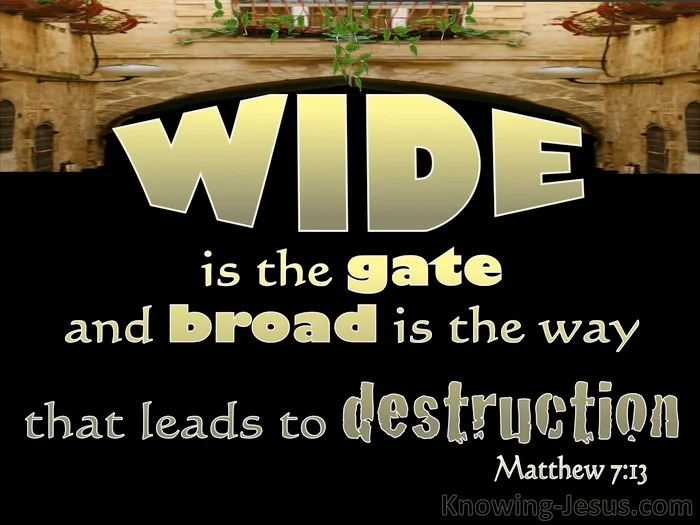
The broad gate is the gate that leads to the broad way. This gate is one that is very easy to walk through and opens to a road that is very easy to travel but is not in the will of God. It is a road that represents a worldly lifestyle, a sinful, carnal lifestyle. When one walks this road, they are walking as an enemy of God. James 4:4reads, “Ye adulterers and adulteresses, know ye not that the friendship of the world is enmity with God? whosoever therefore will be a friend of the world is the enemy of God.”
This reality is because Satan is the ruler of the world until Jesus returns (John 12:31). Satan is referred to as “… the power of the air, the spirit that now worketh in the children of disobedience:”
[Eph 2:2] and is in control of the world unless we choose Jesus as our Lord and Savior. Doing so can save us from the destruction that this path can lead us to suffer ultimately.
To walk the broad road, the carnal road, one must have a carnal mind, and the Scripture reflects how God views a carnal mind. Rom 8:6-8 reads,
6 For to be carnally minded is death; but to be spiritually minded is life and peace.
7 Because the carnal mind is enmity against God: for it is not subject to the law of God, neither indeed can be.
8 So then they that are in the flesh cannot please God.
There is no way God is pleased with a carnal individual because they cannot submit to God’s Law. They are “in the flesh,” meaning that their fleshly—sinful ways are leading them.
The broad way is a much easier way because it requires no sacrifice. The worldly influences are so strong that all we have to do is go with the flow of the current on the broad road. It is the path of least resistance
The broad way is a much easier way because it is most often the most pleasurable way. There is plenty of pleasure when traveling on the broad path. The sex, drugs, revelry, the clubs, and all of the pleasurable material rewards await the traveler of the broad road. The further the travel, the greater the chance of obtaining these rewards. The force pulls one along the way.
One pungent identifying feature of the broad road is that it goes against God’s laws and the teachings of Scripture. The broad road is, in a word—Sin.
This road is so easy to walk on. In fact, all of us walk through this narrow gate when we are born. We are born with a sinful nature. The writer of Ps 51:5, David, reads, “Surely I was sinful at birth, sinful from the time my mother conceived me.” NIV
We are all born in sin, which is why Jesus said, “Verily, verily, I say unto thee, Except a man be born again, he cannot see the kingdom of God.”[John 3:3]
We must be born again and receive Jesus Christ as our Lord and Savior in order to see the kingdom of God. For more information on born again, please see the article, “What Does it Mean to be a Born Again Christian,” on this website
The next most pungent feature of all concerning the broad way is that it requires us to reject Christ. There is no middle path. We are on either the broad way or the narrow way. Jesus said in Matt 6:24, “No man can serve two masters: for either he will hate the one, and love the other; or else he will hold to the one, and despise the other. Ye cannot serve God and mammon.” We cannot serve both God and the world.
The Scriptures describe how the sinful nature manifests itself in Gal 5:19-21
19 The acts of the sinful nature are obvious: sexual immorality, impurity and debauchery;
20 idolatry and witchcraft; hatred, discord, jealousy, fits of rage, selfish ambition, dissensions, factions
21 and envy; drunkenness, orgies, and the like. I warn you, as I did before, that those who live like this will not inherit the kingdom of God. NIV
Again, we see that those who walk the broad way, those who are led by their sinful nature, “will not inherit the kingdom of God.”
The Scriptures also describe how the Spirit manifests itself in Gal 5:22-25
22 But the fruit of the Spirit is love, joy, peace, patience, kindness, goodness, faithfulness,
23 gentleness and self-control. Against such things there is no law.
24 Those who belong to Christ Jesus have crucified the sinful nature with its passions and desires.
25 Since we live by the Spirit, let us keep in step with the Spirit.NIV
If we accept Christ as our Lord and Savior and belong to Christ, we are to live by the Spirit, and as the Scripture reads, “keep in step with the spirit.”
Walking the narrow road is to walk in the Spirit of Christ, the Holy Spirit, and to walk the broad road is to walk in the flesh—the world—the sinful nature. These two paths are in direct conflict with each other. Gal 5:17 reads: “For the sinful nature desires what is contrary to the Spirit, and the Spirit what is contrary to the sinful nature. They are in conflict with each other so that you do not do what you want.” NIV
Many may attempt to walk both paths, known as “on the fence.” However, we can only walk in one way: the broad way or the narrow way, the flesh or the Spirit.
Again— “no man can serve two masters.”
Conclusion
Eccl 12:13-14 reads:
13 Let us hear the conclusion of the whole matter: Fear God, and keep his commandments: for this is the whole duty of man.
14 For God shall bring every work into judgment, with every secret thing, whether it be good, or whether it be evil.
The fact of the matter is that the only way to walk through the narrow gate and walk the narrow way is to revere God, obey His Laws and the teaching of the Scriptures in the Holy Bible. It requires us to submit to the Laws of Christ.

Every work we perform will be judged—the good and the evil.
It behooves us to consider our ways, choose the right path that leads to life, and stay off the broad way that will lead us to eternal destruction.
In 1 Kings 13:1-27, there is an example of one who chose the broad way and experienced the consequence. I pray that we receive wisdom from this passage.
Amen
Any questions, comments, concerns, or experiences of walking either path can be left below.
Blessings
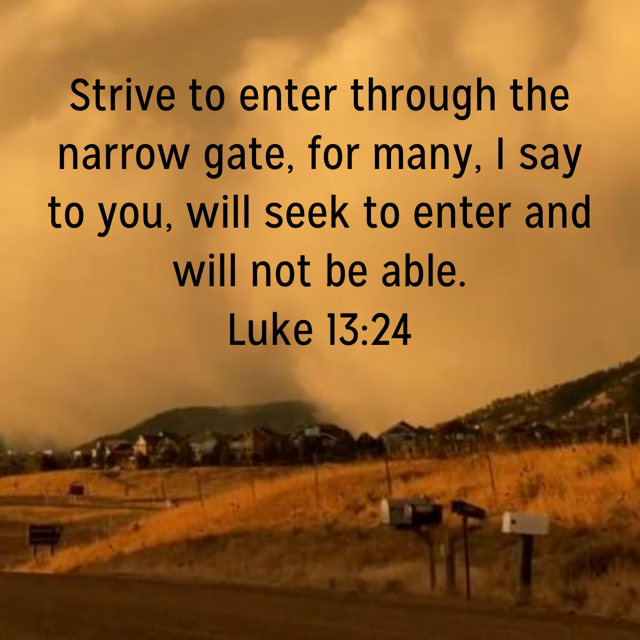
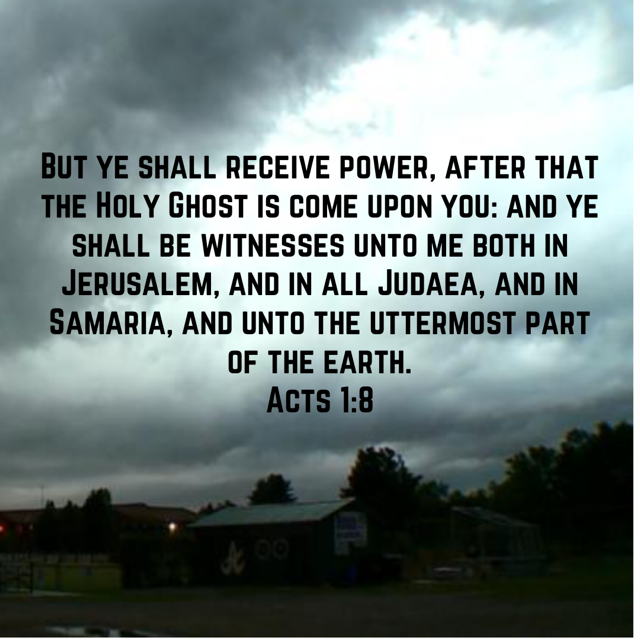
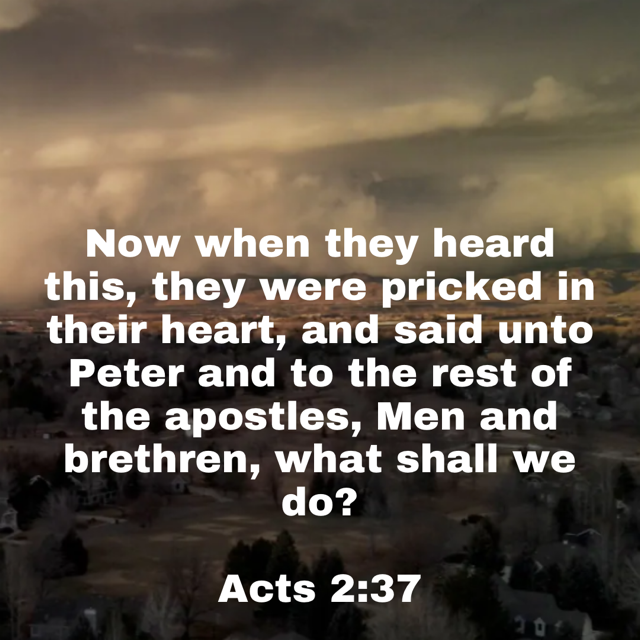
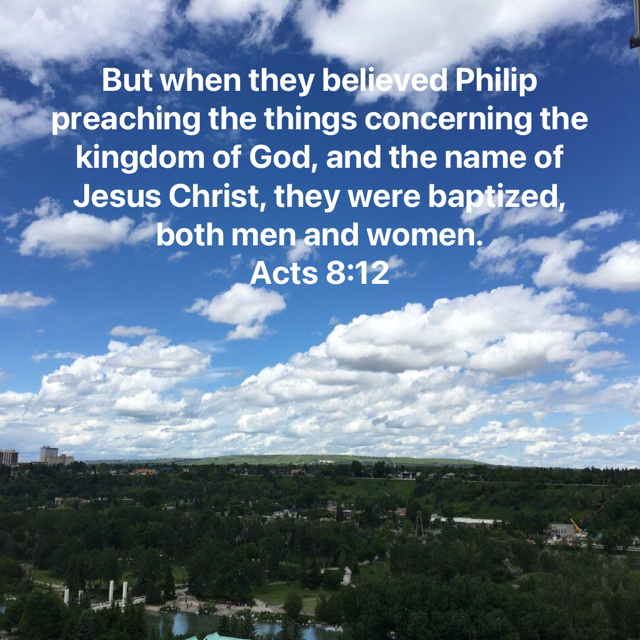
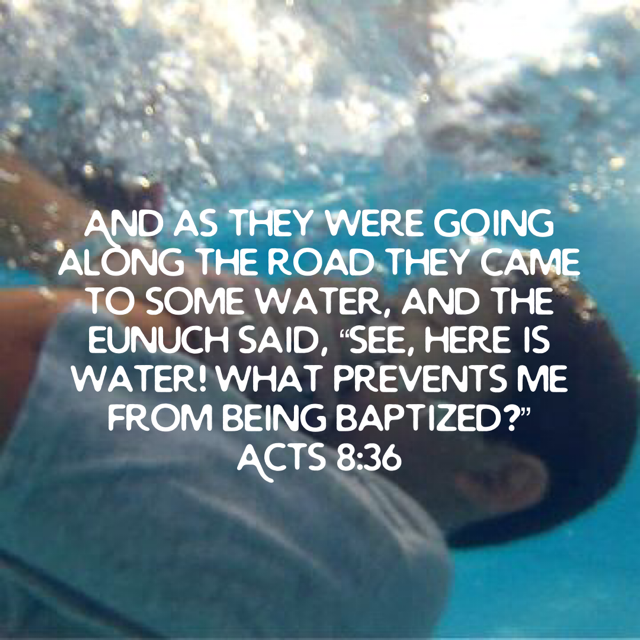



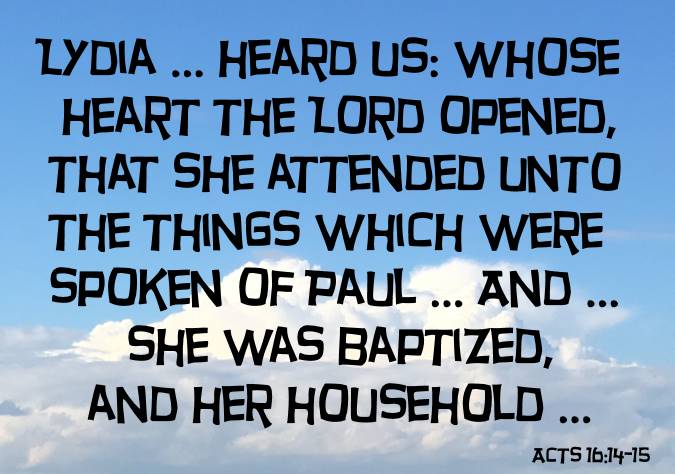
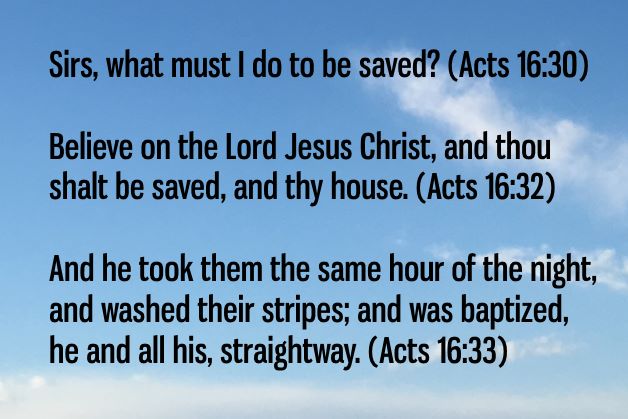
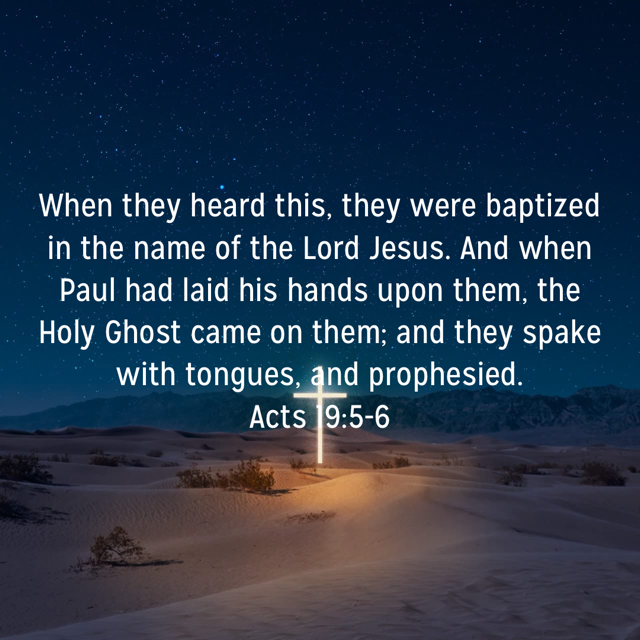
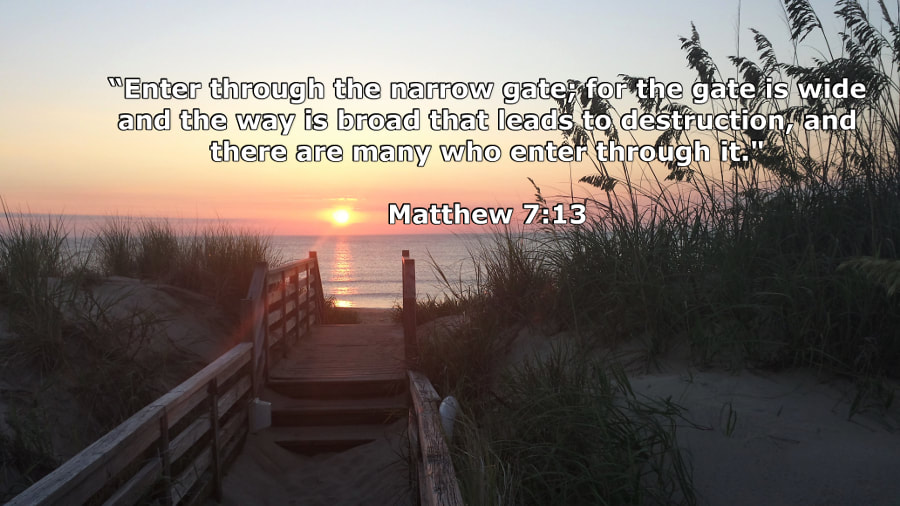

No comments:
Post a Comment